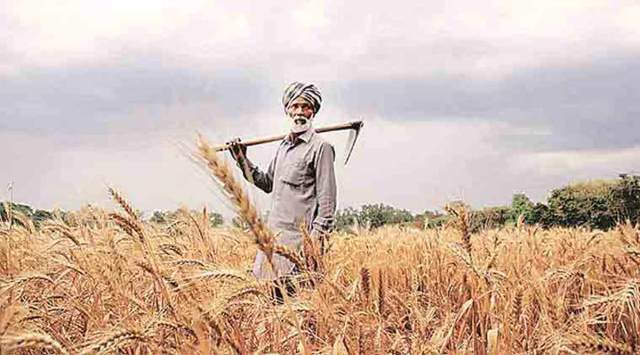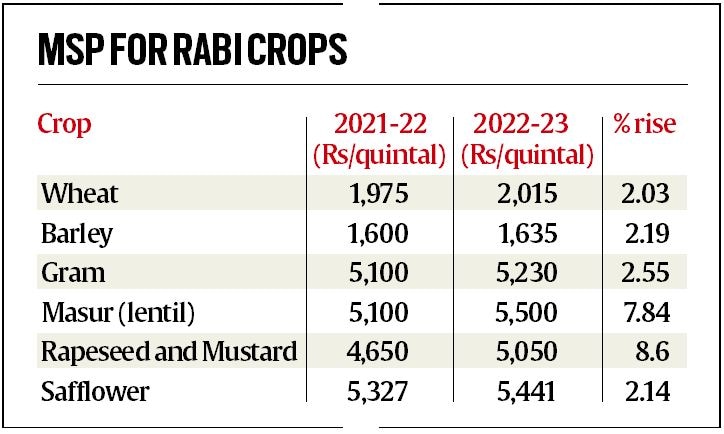At a time when farmers’ protests have flared up in Haryana, the Centre Wednesday announced Minimum Support Price (MSP) for six rabi crops of 2021-22 for the 2022-23 marketing season, with wheat seeing an increase of just 2.03 percent — the lowest in 12 years.
MSPs for other crops — barley, gram, lentil (masur), rapeseed & mustard, and safflower– have been hiked in the range of 2.14-8.60 per cent, with the highest increase, in absolute terms, of Rs 400 per quintal for lentil (masur) and rapeseed & mustard.

The Government said in a statement that the increase in MSP “for all mandated Rabi crops for Rabi Marketing Season (RMS) 2022-23” was “approved” by the Cabinet Committee on Economic Affairs (CCEA) chaired by Prime Minister Narendra Modi.
Welcoming the move, Agriculture Minister Narendra Singh Tomar said that those “spreading the misinformation that MSP will be abolished should learn from this decision”. “The Prime Minister has assured many times that the MSP was there, is there and will continue to be there,” Tomar said in a statement.
Significantly, the wheat MSP for the rabi crop of 2021-22, to be marketed in rabi marketing season 2022-23, has been fixed at Rs 2,015 per quintal — just Rs 40 more than Rs 1,975 in the last year.

The last time wheat MSP saw the lowest increase was in 2009-10, when it was hiked by only Rs 20 — Rs 1,100 per quintal in 2009-10 against Rs 1,080 in 2008-09.
Data available with the Ministry of Agriculture show a steady decline in the rate of increase in wheat MSP since 2017-18 when it was hiked by 6.77 per cent. It saw lower increases in 2018-19 (6.05%), 2019-20 (4.62%) and 2020-21 (2.60%) — the increase last time was of Rs 50.
Story continues below this ad
The lower increase assumes significance this time as Punjab and Haryana, the two states which have been witnessing farmers’ protests, supply most to the national food basket. The protesting farmers are demanding a legal guarantee for MSP.
Besides, two wheat producing states — Punjab and Uttar Pradesh — will see assembly elections next year.
In the rabi marketing season of 2021-22, 132.10 lakh metric tonnes of wheat was procured in Punjab, 84.93 lakh in Haryana and about 56 lakh in UP. Out of 433.32 lakh metric tonnes of wheat procured during RMS 2021-22, a little over half came from Punjab and Haryana.
Around 50 lakh farmers availed the wheat MSP during RMS 2021-22.
Story continues below this ad
According to the Government, “The expected returns to farmers over their cost of production are estimated to be highest in case of wheat and rapeseed & mustard (100% each), followed by lentil (79%); gram (74%); barley (60%); safflower (50%).”
It said: “The increase in MSP for Rabi Crops for RMS 2022-23 is in line with the Union Budget 2018-19 announcement of fixing the MSPs at a level of at least 1.5 times of the all-India weighted average cost of production, aiming a reasonably fair remuneration for the farmers.”
The MSP for rapeseed & mustard has been hiked to Rs 5,050 per quintal for RMS 2022-23, which is Rs 400 or 8.60.08 percent higher than Rs 4,650 in RMS 2021-22. “In case of safflower, there has been an increase of Rs 114 per quintal, in comparison to last year,” the Government said.
“Concerted efforts were made over the last few years to realign the MSPs in favour of oilseeds, pulses and coarse cereals to encourage farmers shift to larger areas under these crops and adopt best technologies and farm practices, to correct demand — supply imbalance,” it said.
Story continues below this ad
“Additionally, National Mission on Edible Oils-Oil Palm (NMEO-OP), the centrally sponsored scheme recently announced by the Government, will help in increasing the domestic production of edible oils and reduce imports dependency,” it said.










